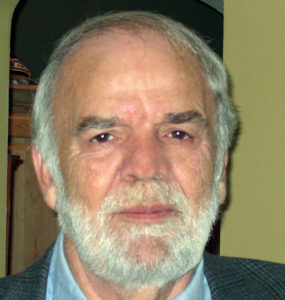Larry L. Jacoby, an internationally recognized scholar of human memory and professor of psychological and brain sciences in Arts & Sciences at Washington University in St. Louis, has been elected to the American Academy of Arts & Sciences.

Jacoby, one of 236 new members announced by the academy on April 20, joins a prestigious list of recipients that includes winners of the Pulitzer Prize and the Wolf Prize; MacArthur and Guggenheim fellowships; the Fields Medal; the Grammy Award; and the National Book Award.
Founded in 1780, the American Academy of Arts & Sciences is one of the country’s oldest learned societies and independent policy research centers, convening leaders from the academic, business and government sectors to respond to the challenges facing — and opportunities available to — the nation and the world. Including Jacoby, there are 64 current or past academy members connected to Washington University.
Jacoby is known for his imaginative investigations of unconscious influences of memory, the nature of memory attributions and the effects of cognitive aging on memory. Through experimental and modeling techniques, Jacoby pioneered new and powerful ways to measure the joint roles of consciously controlled and automatic processes in task performance. His ideas are credited with helping researchers better understand a range of age-related differences in memory.
“Larry Jacoby is a creative, innovative researcher who is changing the way we understand memory and the process of aging,” Chancellor Mark S. Wrighton said. “His election to the American Academy is a fitting recognition for his entire body of work, and for the influence his work will have on his peers and on the next generation of researchers in this important field of study.”
Jacoby earned his doctoral degree in psychology from Southern Illinois University Carbondale in 1970 and took his first faculty job at Iowa State University. In 1975, he moved to McMaster University in Canada. He joined Washington University as a professor of psychology in Arts & Sciences in 2000.
His contributions to the field earned two other prestigious honors in 2013: the Association for Psychological Sciences’ William James Fellow Award for members “recognized internationally for their outstanding contributions to scientific psychology,” and the Society of Experimental Psychologists’ Norman Anderson Lifetime Achievement Award. In 2015, he received the Lifetime Contribution Award from the American Psychological Association, Division 3. Jacoby also is included on the Thomson Reuters list of highly cited researchers.
Jacoby’s early work included important contributions to the understanding of how information is transferred from short-term to long-term memory, on levels of memory processing and on implicit or indirect measures of memory.
He co-published pioneering studies on “memory attributions,” which examined the influences of implicit forms of memory and how they could occasionally intrude into conscious decisions, and vice versa. For example, his work on the false-fame effect, or “becoming famous overnight,” showed that when people are exposed repeatedly to a non-famous name, such as Sebastian Weisdorf, and then time passes so that they no longer explicitly recollect having seen the name, they would later judge the name as being famous.
Jacoby also published important papers on the ingenious process dissociation procedure, which permits separate estimates of the contributions of controlled and automatic processes in a variety of tasks, and has had a huge influence on research in several fields of psychology. The paper has been cited more than 3,000 times.
During the last two decades, his research has expanded to include studies of cognitive aging, including the development of novel techniques to illuminate the interplay between conscious and non-conscious memory processes in older adults. His work demonstrated that older adults are particularly susceptible to false-fame effects, as well as other memory errors and illusions due to a deficit in controlled processes in combination with preserved automatic processes.
At Washington University, Jacoby directs the Aging, Memory and Cognitive Control Lab in the Department of Psychological & Brain Sciences in Arts & Sciences. Research in the lab focuses on questions related to cognitive control and to subjective experience, especially the distinction between consciously controlled and automatic processes. Other research investigates age-related differences in memory and perception, memory illusions and cognitive factors influencing learning and education.